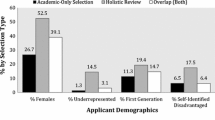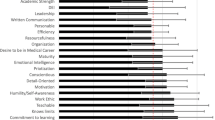Abstract
Objective
This study aims to evaluate the capacity of a holistic review process in comparison with non-holistic approaches to facilitate mission-driven recruitment in residency interview screening and selection, with particular attention to the promotion of race equity for applicants underrepresented in medicine (URM).
Methods
Five hundred forty-seven applicants to a psychiatry residency program from US allopathic medical schools were evaluated for interview selection via three distinct screening rubrics—one holistic approach (Holistic Review; HR) and two non-holistic processes: Traditional (TR) and Traditional Modified (TM). Each applicant was assigned a composite score corresponding to each rubric, and the top 100 applicants in each rubric were identified as selected for interview. Odds ratios (OR) of selection for interview according to URM status and secondary outcomes, including clinical performance and lived experience, were measured by analysis of group composition via univariate logistic regression.
Results
Relative to Traditional, Holistic Review significantly increased the odds of URM applicant selection for interview (TR-OR: 0.35 vs HR-OR: 0.84, p < 0.01). Assigning value to lived experience and de-emphasizing USMLE STEP1 scores contributed to the significant changes in odds ratio of interview selection for URM applicants.
Conclusions
Traditional interview selection methods systematically exclude URM applicants from consideration without due attention to applicant strengths or potential contribution to clinical care. Conversely, holistic screening represents a structural intervention capable of critically examining measures of merit, reducing bias, and increasing URM representation in residency recruitment, screening, and selection.

Similar content being viewed by others
References
Talamantes E, Henderson M, Fancher T, Mullan F. Closing the gap - making medical school admissions more equitable. N Engl J Med. 2019;380:803–5.
Deville C, Hwang W-T, Burgos R, Chapman C, Both S, Thomas CR. Diversity in graduate medical education in the United States by race, ethnicity, and sex, 2012. JAMA Intern Med. 2015;175:1706–9.
An American Crisis. The growing absence of black men in medicine and science. Washington, DC: The National Academies Press; 2018.
Komaromy M, Grumbach K, Drake M, Vranizan K, Lurie N, Keane D, et al. The role of Black and Hispanic physicians in providing health care for underserved populations. N Engl J Med. 1996;334:1305–10.
Walker KO, Moreno G, Grumbach K. The association among specialty, race, ethnicity, and practice location among California physicians in diverse specialties. J Natl Med Assoc. Elsevier Masson SAS. 2012;104:46–52. https://doi.org/10.1016/S0027-9684(15)30126-7.
Hsu P, Balderas-Medina Anaya Y, Hayes Bautista D. 5 Centuries to reach parity: an analysis of how long it will take to address California’s Latino physician shortage. UCLA Lat Policy Polit Initiat. 2018; Available from: https://latino.ucla.edu/wp-content/uploads/2018/10/5-Centuries-to-Reach-Parity-UCLA-LPPI.pdf. Accessed 8 December 2019.
Nivet MA. Diversity 3.0: a necessary systems upgrade. Acad Med. 2011;86:1487–9.
Edmond MB, Deschenes JL, Eckler M, Wenzel RP. Racial bias in using USMLE Step 1 scores to grant internal medicine residency interviews. Acad Med. 2001;76:1253–6.
Boatright D, Ross D, O’Connor P, Moore E, Nunez-Smith M. Racial disparities in medical student membership in the alpha omega alpha honor society. JAMA Intern Med. 2017;177:659–65.
Ross DA, Boatright D, Nunez-Smith M, Jordan A, Chekroud A, Moore EZ. Differences in words used to describe racial and gender groups in Medical Student Performance Evaluations. PLoS One. 2017;12:e0181659.
Wijesekera T, Kim M, Moore EZ, Sorenson O, Ross DA. All other things being equal: exploring racial and gender disparities in medical school honor society induction. Acad Med. 2019;94:562–9.
Aibana O, Swails JL, Flores RJ, Love LT. Bridging the gap: holistic review to increase diversity in graduate medical education. Acad Med. 2019;94:1137–41.
Chen DR, Priest KC, Batten JN, Fragoso LE, Reinfeld BI, Laitman BM. Student perspectives on the “step 1 climate” in preclinical medical education. Acad Med. 2019;94:302–4.
Freeman AD, Freeman AD. Legitimizing racial discrimination through antidiscrimination law: a critical review of supreme court doctrine. Minn Law Rev. 1978;62.
Boyd RW. The case for desegregation. Lancet Elsevier Ltd. 2019;393:2484–5.
Coleman AL, Lipper KE, Taylor TE, Palmer SR. Roadmap to diversity and educational excellence: key legal and educational policy foundations for medical schools. A Report for the Association of American Medical Colleges. Washington, DC; 2014. Available from: https://store.aamc.org/downloadable/download/sample/sample_id/192
Dort JM, Trickey AW, Kallies KJ, Joshi ART, Sidwell RA, Jarman BT. Applicant characteristics associated with selection for ranking at independent surgery residency programs. J Surg Educ Elsevier. 2015;72:e123–9.
UCSF. URM Definition [Internet]. 2019. p. 2019. Available from: https://diversity.ucsf.edu/URM-definition. Accessed 8 December 2019.
Cuddy MM, Swanson DB, Clauser BE. A multilevel analysis of examinee gender and USMLE step 1 performance. Acad Med. 2008;83:58–62.
Veloski JJ, Callahan CA, Xu G, Hojat M, Nash DB. Prediction of students’ performances on licensing examinations using age, race, sex, undergraduate GPAs, and MCAT scores. Acad Med. 2000;75:S28–30.
Girotti JA, Chanatry JA, Clinchot DM, McClure SC, Sein AS, Walker IW, et al. Investigating group differences in examinees’ preparation for and performance on the new MCAT exam. Acad. Med. 2019.
Moynahan KF. The current use of United States medical licensing examination step 1 scores: holistic admissions and student well-being are in the balance. Acad Med. 2018;93:963–5.
Bewick V, Cheek L, Ball J. Statistics review 8: qualitative data - tests of association. Crit Care. 2004;8:46–53.
Bonilla-Silva E. Rethinking racism: toward a structural interpretation. Am Sociol Rev. 2006;62:465.
Agapoff JR, Tonai C, Eckert DM, Gavero G, Goebert DA. Challenges and perspectives to the rise in general psychiatry residency applications. Acad Psychiatry. 2018;42:674–6.
AAMC. 2019 FACTS: Electronic Residency Application Service (ERAS) [Internet]. 2020 [cited 2020 Feb 23]. Available from: https://www.aamc.org/data-reports/students-residents/interactive-data/2019-facts-electronic-residency-application-service-eras-data. Accessed 23 February 2020.
Johnson TJ, Ellison AM, Dalembert G, Fowler J, Dhingra M, Shaw K, et al. Implicit bias in pediatric academic medicine. J Natl Med Assoc. Elsevier Inc. 2017;109:156–63. https://doi.org/10.1016/j.jnma.2017.03.003.
Iglehart JK. Diversity dynamics - challenges to a representative U.S. medical workforce. N Engl J Med. 2014;371:1471–4.
Ford CL, Airhihenbuwa CO. The public health critical race methodology: praxis for antiracism research. Soc Sci Med. 2010;71:1390–8.
Krieger N, Alegría M, Almeida-Filho N, Barbosa da Silva J, Barreto ML, Beckfield J, et al. Who, and what, causes health inequities? Reflections on emerging debates from an exploratory Latin American/North American workshop. J Epidemiol Community Health. 2010;64:747–9.
Sklar DP. Racial violence, academic medicine, and academic medicine. Acad Med. 2015;90:1577–80.
Mgbako O. The Unicorn. JAMA. 2019;321:149–50. Available from: http://www.nber.org/papers/w24787.
Teherani A, Hauer KE, Fernandez A, King TE, Lucey C. How small differences in assessed clinical performance amplify to large differences in grades and awards: a cascade with serious consequences for students underrepresented in medicine. Acad Med. 2018;93:1286–92.
Smith DG. Building institutional capacity for diversity and inclusion in academic medicine. Acad Med. 2012;87:1511–5.
ACGME. Common program requirements (residency) [Internet]. Acgme. 2019. Available from: https://www.acgme.org/Portals/0/PFAssets/ProgramRequirements/CPRResidency2019.pdf. Accessed 23 February 2020.
Bandiera G, Abrahams C, Ruetalo M, Hanson MD, Nickell L, Spadafora S. Identifying and promoting best practices in residency application and selection in a complex academic health network. Acad Med. 2015;90:1594–601.
Fernandez A. Further incorporating diversity, equity, and inclusion into medical education research. Acad Med. 2019;94:S5–6.
Cyrus KD. Medical education and the minority tax. JAMA. 2017;317:1833–4.
Osseo-asare A, Balasuriya L, Huot SJ, Keene D, Berg D, Nunez-smith M, et al. Minority resident physicians’ views on the role of race/ethnicity in their training experiences in the workplace. JAMA Netw Open. 2018;1:1–11.
Palepu A, Carr PL, Friedman RH, Amos H, Ash AS, Moskowitz MA. Minority faculty and academic rank in medicine. J Am Med Assoc. 1998;280:767–71.
Diaz T, Navarro JR, Chen EH. An institutional approach to fostering inclusion and addressing racial bias: implications for diversity in academic medicine. Teach Learn Med Routledge; 2019;0:1–7.
Acknowledgments
Thanks go to Evelyn Carter, PhD, for her contribution to conception of this Holistic Review rubric. Additional thanks to Dr. Theodore Hall and Lingqi Tan, PhD, for their insightful feedback. We additionally thank members of the “2018-19 Recruitment Task Force” including Drs. Erin Samplin, T.C. Scotton, Maria Gabriela Aguilera Nunez, and Evelyn Nelson. Finally, we thank each of the many residents who volunteered their time and energy to participate in Holistic Review.
Funding
N.B. is supported the by the APA SAMHSA Minority Fellowship, Grant 1H79SM080388-01. E.B. is supported by funding from the Los Angeles County Department of Probation and from the National Institute on Drug Abuse of the National Institutes of Health under the AACAP NIDA K12 program, Grant # K12DA000357, the California Community Foundation, and the UCLA Pritzker Center for Strengthening Children and Families. Dr. Goodsmith was supported by the VA Office of Academic Affiliations through the UCLA National Clinician Scholars Program. The contents do not represent the views of the U.S. Department of Veterans Affairs, the United States Government, or affiliated institutions.
Author information
Authors and Affiliations
Corresponding author
Ethics declarations
This study qualified for exemption by the Institutional Review Boards at UCLA Medical Center.
Disclosures
On behalf of all authors, the corresponding author states that there is no conflict of interest.
Additional information
Publisher’s Note
Springer Nature remains neutral with regard to jurisdictional claims in published maps and institutional affiliations.
Rights and permissions
About this article
Cite this article
Barceló, N.E., Shadravan, S., Wells, C.R. et al. Reimagining Merit and Representation: Promoting Equity and Reducing Bias in GME Through Holistic Review. Acad Psychiatry 45, 34–42 (2021). https://doi.org/10.1007/s40596-020-01327-5
Received:
Accepted:
Published:
Issue Date:
DOI: https://doi.org/10.1007/s40596-020-01327-5




